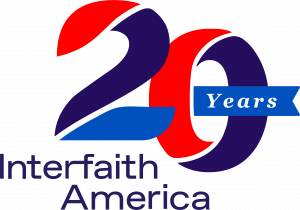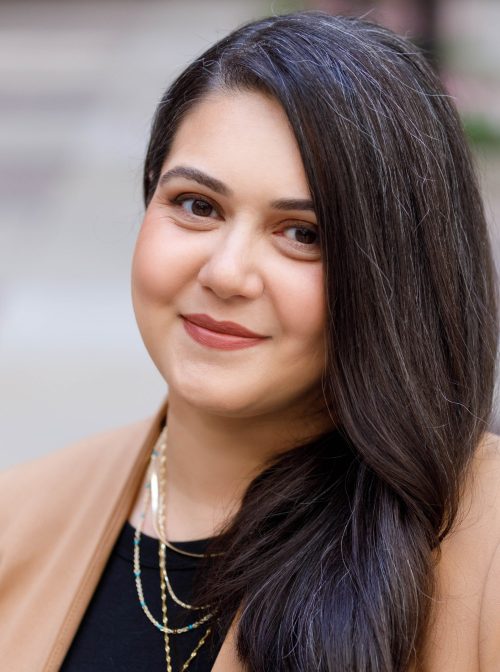To mark the 20th anniversary of Interfaith America, we spoke with individuals connected to the organization about their own interfaith work, memories of Interfaith America, and their hopes for the future of interfaith cooperation.
Interfaith America Magazine’s Allie Vroegop interviewed Jenan Mohajir, Senior Director of Special Projects at Interfaith America. Inspired by faith and family to work for change at the intersections of gender, sexuality, race, and religion, Mohajir has served in leadership IA for 15 years where she as has trained hundreds of interfaith leaders from diverse backgrounds to foster a vision and practice of civically-engaged interfaith leadership.
This conversation was lightly edited for length and clarity.

Allie Vroegop: How did you start in interfaith work and how did you get connected with Interfaith America?
Jenan Mohajir: I first heard about Interfaith Youth Core (what’s now Interfaith America) as a young teacher, while working at a school called Universal School, a small Muslim school in the outskirts of Chicago. A friend working [at IFYC] came to me because they were doing an MLK Day service event and hoped that I could connect them with some students. I and two other teachers sent high schoolers to come attend the MLK Day event, and afterward, the students came back to school saying this was the first time that they had met people who were different kinds of Muslims than they were. It was also the first time that they had met people of other religious traditions. It was interesting to see them come back and basically say, “We don’t know so much stuff about our own tradition and we want to do an after-school program.” It gave them a way to come into a full sense of who they were, by interacting with people who are different [than them]. And that was my entry point into the organization. As a result, you know, a couple of years later, when there was a position opened up, I came to Interfaith America through that experience as a teacher.
AV: Is there a special memory you have of your time so far with the organization?
JM: There are a couple of different things that come to mind including one when we were running an international program out of India. As part of that, initially, I ran this multilingual training about interfaith leadership. And through that training, it was mostly for people based in Delhi, there was one woman who came from a neighboring state. She sat in the back of the room and was participating, but it was also clear that she wasn’t necessarily a nonprofit worker. This woman was very engaged, but also was not saying much and as a result, I wondered if she was grasping the material, so I went up to her at the end of the day to introduce myself. Turns out that she had actually come from Gujarat, which is a neighboring state. Gujarat is a place where in 2002, there had been major riots and hundreds of thousands of people, many Muslims, had been displaced from their homes, and this woman was one of those people. Twenty-two people in her family had been killed in the riots and that included her daughter and her husband. The only reason that she was still alive was because she happened to be in outpatient surgery that day for some small procedure, and her doctor who was Hindu had put her under anesthesia and had put a red bindi on her forehead, which is an identifying marker for a Hindu woman. She was alive because this doctor saved her life. I said to her that she is someone who has lost so much and asked why she was at this training. She said, “I don’t ever want another woman to go through what I’m what I’ve been through, regardless of who she is religiously.” I will never forget that.
AV: What is something that you’re proud of with the work of the organization?
JM: I’m really proud of the curriculum that we’ve built including with the Interfaith Leadership Summit for the last 12 years. The amount of curriculum and training that we have built out, it’s such a gift to a lot of people and has both produced so many leaders and has had such an impact on so many people’s lives.
AV: What are you excited about for the organization in the future?
JM: A few things that come to mind. One is the work that we did for FIVA, for the Faith in the Vaccine Ambassadors program. It was meaningful in a lot of ways especially to be able to answer the call that our communities had with resources and a concrete set of skills that were helpful to people in that space. We are really good at that, and in lots of different ways. We’re good at that with curriculum, relationship building, and how we bring people together. Coalition is a very political term, but how we build social capital around an idea, is something we do well, and we can do that for a number of different causes.
I’m looking forward to how we continue to use our skill sets and our power in order to make things relevant for today’s communities, both religious communities and communities at large. I’m excited to see where the Black Interfaith Project is going to grow as well as having the Vote is Sacred continue as we go into an election year in 2024. All of these things have a lot of potential, and I’m excited about how we could be leveraging our collective power as an organization to really move the conversation on those issues.




